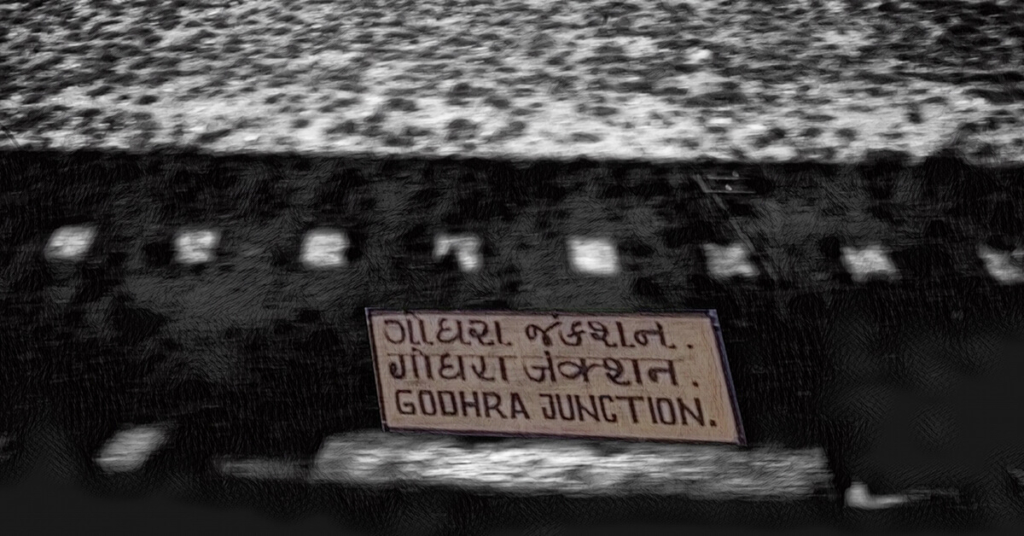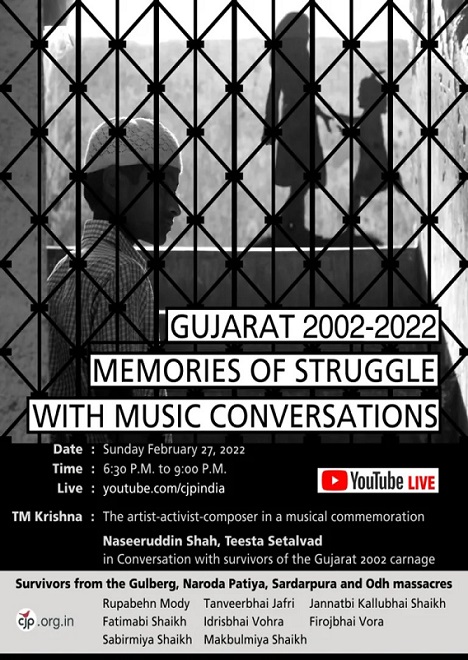
Revisiting Godhra: Voices of survivors A compilation of first-person accounts of Godhra train burning survivors and the families of victims
22, Feb 2022 | CJP Team
On February 27, 2002, the S6 coach of the Sabarmati Express was set on fire in Godhra – an event that cannot be erased from public memory, especially given the communal violence that transpired in its aftermath. 20 years after the shocking incident, we take a look back at one of the most horrifying days in Indian history, through the eyes of the survivors themselves as recorded in various news media reports.
All stories before and after the Gujarat carnage of 2002, that were published in Communalism Combat, were the result of intrepid reporting and painstaking research by Teesta Setalvad. In 2002, she visited the various sites of carnage as well as the shelter camps, and spoke to survivors and the families of victims. Setalvad, a journalist who has been tracking Gujarat since the mid-1980s, often had limited or no resources compared to other reporters from mainstream media, and yet managed to get some of the most stark and heart-rending stories from one of the darkest periods in Indian history.
After pelting stones, they started pouring kerosene in our compartments and set them afire. Only a few of us managed to come out of the broken windows. The adults and the old people were stuck inside. The old women were pleading, ‘don’t kill us’ but they just didn’t listen.”
– Gayatri Panchal (The Indian Express, 28 February 2002)
It was vandalism at its worst. They did not even spare old people like me and pelted stones indiscriminately. They will all go to hell for this act of malice.”
– Devika Luhana (Mid-day, 6 March, 2002)
CJP has been fighting for justice alongside the survivors of the Gujarat 2002 carnage for 20 years. The legal battle has moved back and forth between the trial courts and the Supreme Court. We have taken up, in all, as many 68 cases from the Magistrate Court upwards to the Supreme Court, and ensured 172 convictions at the first stage, with 124 being to life imprisonment. Though some of these have been overturned in appeal, CJP’s unique legal journey has pioneered criminal justice reform whether it is the right of Survivors/Victims to participate in criminal trials or Witness Protection. CJP is committed to continuing its quest for exemplary justice, so that the healing process can begin. To support us, please Donate Now.
On the 20th anniversary of the Gujarat carnage, we are coming together to reflect on this struggle for justice. Watch it here: https://www.youtube.com/

They stormed inside the women’s bogey, and before we could react, they set the entire bogie on fire. Some of us managed to escape, but a number of our sisters got trapped… it was horrifying.”
– Hetal Patel (Mid-day, 6 March, 2002)
I cannot forget the sight of people burning in front of me. The train had just left Godhra but stopped a little way away from the station. Suddenly, stones were being thrown at the train. The pelting continued for almost an hour. Then something was hurled into our coach and there was smoke everywhere.It was so suffocating I could hardly breathe. I heard my father telling me to get off the train. I went to the door but saw that people trying to get off were being stabbed. I went to the other side and jumped off.”
– Gyanprakash (Mid-day, 6 March, 2002)
I saw a broken window. Its bars had also been twisted apart.The attack itself had actually opened up a way for me. At that moment, it was a choice between the devil and the deep sea. The flames were leaping up close to me. I would have been engulfed in them or asphyxiated if I stayed back. The other choice was to climb out of the window and face the rampaging mob. I chose the latter.”
– D Bhattacharya (The Times of India, 28 February 2002)
I am extremely disturbed over what is happening in our area. I had pleaded with folded hands to all who came to my son’s cremation to please restrain themselves and maintain peace. Killing other people is not the solution. Losing a son is shattering, and I want no father or mother to suffer from this feeling.”
– Govind Makwana whose only son Umakant, 22, was burnt alive on board the Sabarmati Express. (The Times of India, 3 March 2002)
The above testimonies were originally published under the title “Victim’s Voices”, in Communalism Combat, March-April 2002 issue.
Time and wounds
Over a year later, on October 5, 2003, four families of Godhra victims held a press conference in Mumbai, where they had come to seek help from Citizens for Justice and Peace (CJP) with legal proceedings. They spoke out about the political manipulation and pressure they had been facing from right-wing forces. Despite their personal suffering in the Godhra tragedy, they refused to be pawns of communal revenge politics. Here are select excerpts from the story published in Communalism Combat.
Dr. Girishbhai Rawal, 82-years-old, is a singularly brave man. Sudhabehn (76), his wife died a horrible death in Godhra, by burning and asphyxiation. “When you are young, there is romance and desire,” he told us, “But when you reach our age there is something more precious. There is harmony and sharing. I have lost the harmony of my existence,” he said, as tears rolled down his weathered cheeks for the first time.
Girishbhai faced a second tragedy soon after losing his precious Sudhabehn. On April 16, 2002, he lost his 42-year-old son Ashwinbhai Rawal. Ashwinbhai, the local Bajrang Dal chief, was stabbed to death in a communal killing in Ramol. Repeated appeals by local residents to the state and city police to put up an effective police chowkey in the area had gone unheeded.
Before her tragic death, Sudhabehn was associated with the Khoja Council of the Aga Khan Foundation, working with children of all faiths. Neither she, nor her husband, nor her 18-year-old grand-daughter, Khushboo, nor her widowed daughter-in-law, Belabehn, ever shared the hatred and venom that the VHP-BJP-RSS-BD brand of politics espouses.
Khushboo brought tears to many eyes during the press meet in Mumbai when she said without a trace of artifice, “My father was drawn to the politics of Hindutva. But none of the rest of our family is enamoured of it. The building of the Ram temple is not as important as communal harmony and peace. The coming yatra must be stopped. People must realise that there is only death, destruction and violence after such activities.”
Dr Rawal, in his cogent and articulate affidavit filed in the Supreme Court of India, has clearly stated that the failure of the VHP-BJP to bring back the yatris safely had to do with the intemperate and abusive behaviour of the kar sevaks on their way to, and while returning from, Faizabad-Ayodhya. He has also clearly stated that under the current regime in Gujarat, the chances of free and fair investigation and trial are remote; unless the trials are shifted outside of Gujarat, justice will not be done.
No honest inquiry into the tragedy is taking place, the reports of forensic experts who have stated that 60 litres of inflammable liquid simply could not have been flung from outside into the compartment given the topography of the area, are being buried and denied, the affidavit has said. “We have been used; Godhra has been used to justify violence against our own people in every nook and corner. Is this Hinduism? It is not. I feel ashamed.”
The families of Dr Girishbhai Rawal, Sharadbhai Mhatre, Bharatbhai Panchal and Prakashbhai Chodagar all lived in Janata Nagar, Ramol, a communally sensitive area of Ahmedabad city. Each family has lost a female member.
Sudhabehn, Malabehn, Jyotibehn and Nilimabehn (Amibehn) were religious-minded, mutual friends. None was a member of the VHP-BD or the BJP. They had simply been attending the VHP-organised satsanghs every Saturday in their housing society and who felt that the VHP’s plan to take people to Ayodhya offered them the chance of a free religious pilgrimage; that too in each other’s company. Neetabehn Panchal, a leader of the Durga Vahini, was instrumental in enthusing them for the yatra from which they never returned. In all, 10 women from Janata Nagar died in the mass arson.
Sharadbhai had been reluctant to let his wife undertake the journey to Ayodhya. But with a chance to make a religious pilgrimage, that too with close friends like Jyotibehn and Amibehn, she was adamant. He now has two children to raise without a mother.
“We realise now how we and others have been made pawns in the VHP and BJP game. They say things, use abusive and offensive language. This upsets the tranquillity of local areas and people get fooled and drawn to this. I have plied rickshaws for a living for years but never thought about the religion of my passengers. They say such things to trap people into joining them. That is all,” says an angry Bharatbhai, who now faces the task of bringing up 16-year-old Shefali and his younger son, Dhawal, all alone. Bharatbhai is suspicious about why none of the leaders of the BJP and VHP, who had encouraged innocent believers to make the yatra and accompanied them, suffered any injury on that fateful day.
“For years, Hindu and Muslim children, as also little ones of other faiths, have always been ferried by us in our rickshaws to and from school. This was true about Ahmedabad and the rest of Gujarat. But today’s Gujarat is no longer the Gujarat we had known and lived in. Never before has Gujarat been so demeaned as by this regime. There is distance and hatred everywhere. Is this the way to treat our own people? Cutting up people, burning and killing them? As Gujaratis, how can we be proud of what happened to young girls and women in Gulberg society, in Naroda Pattiya?” These are the words of Prakashbhai, simple and reticent, but clear and firm in his convictions.
**The above was originally published under the title “Godhra Revisited” in Communalism Combat, October 2003 issue.
Related archives:
Godhra – March-April 2002
Victim’s Voices – March-April 2002
Godhra Revisited – October 2003










